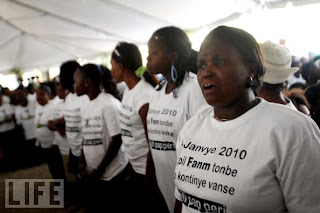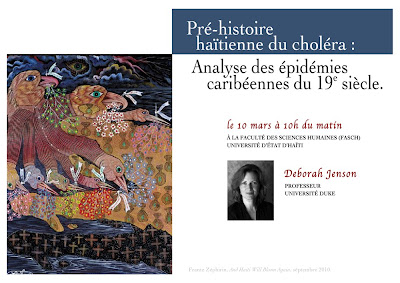Today is the 100th anniversary of International Woman’s Day and I have been thinking quite a bit about what this day means in Haiti, how we celebrate it and why. One of the reasons why this has been on my mind is certainly because Manolia Charlotin, the fabulous editor of the Boston Haitian Reporter has asked me to write a piece for that paper about the most pressing issues facing Haitian women today. But also because like so many others I have been following the presidential race and campaigning between Mirlande Manigat and Michel ‘Sweet Micky’ Martelly with marked interest, wondering what it would mean for Haiti to join the ranks of states with women leaders. Full disclosure here: I am not saying that I support either candidate for president, but rather merely considering some of the cultural implications that Manigat's presidency would raise.
Last fall I had a candid conversation with former Prime Minister Michele Pierre-Louis about being a woman politician in Haiti and what the small numbers of those who have actually held this role means for those who may want to hold it in the future. Of course, being a female candidate does not necessarily mean having a feminist agenda. I think that the candidacy of Sarah Palin in the USA taught us that the two are not bound to one another. But it is nonetheless interesting to think about what having a woman in the highest office would mean figuratively for us as a nation, especially one with such a dominant tradition of masculine leadership beginning with the Revolutionary heroes. When we consider the extent to which Haitian women’s history and participation in the public sphere is often framed in relation to silence, we are reminded of some of the barriers to leadership women may face. Indeed Manigat would not be the first Haitian woman to occupy a political office. Ertha Pascale Trouillot became the first woman to hold the highest office in the land albeit only briefly during her time as interim president. Others like Claire Lydie Parent serve as mayor, and of course various ministerial posts such as the Minister of Culture and Communication held by Marie-Laurence Lassegue, and the Minister of the Condition of Women, a post once held by the late Myriam Merlet and now by Marjorie Michel.
The idea of a woman president is especially compelling today given that recently many women have risen to power in countries around the world. There are currently 19 female heads of state in the world: President Cristina Fernandez de Kirchner of Argentina; Prime Minister Julia Gillard of Australia; Prime Minister Sheikh Hasina of Bangladesh; President Borjana Kristo of Bosnia and Herzogovina ; President Dilma Rousseff of Brazil; Prime President Laura Chinchilla of Costa Rica, Prime Minister Jadranka Kosor of Croatia; President Tarja Halonen of Finland; Prime Minister Mari Johanna Kiviniemi of Finland; Chancellor Angela Merkel of Germany; Minister Johanna Sigurdardottir of Iceland; President Prathiba Patil of India; President Mary McAleese of Ireland; President Roza Otunbayeva of Kyrgyzstanl; President Ellen Johnson Sirleaf of Liberia; President Dalia Grybauskait of Lithuania; Prime Minister Iveta Radicova of Slovakia; President Doris Leuthard of Switzerland; and Prime Minister Kamla Persad-Bissessar of Trinidad and Tobago.
These women's politics, policies and viewpoints range from conservative to liberal, but two in particular stand out for their commitment to transforming the lives of women. For example, when Dilma Rousseff was elected as the first female president of Brazil, she made this commitment explicit. "I am here stating my first post-election commitment: to honor Brazilian women so that this fact -- unprecedented until now -- becomes something normal and can be repeated and expanded in companies, public institutions, and organizations that are representative of our entire society…” In her inaugural speech in 2005 Ellen Johnson Sirleaf concluded with a special message for the women of Liberia: "My Administration shall thus endeavor to give Liberian women prominence in all affairs of our country. My Administration shall empower Liberian women in all areas of our national life. We will support and increase the writ of laws that restore their dignity and deal drastically with crimes that dehumanize them. We will enforce without fear or favor the law against rape recently passed by the National Transitional Legislature. We shall encourage families to educate all children, particularly the girl child. We will also try to provide economic programs that enable Liberian women - particularly our market women - to assume their proper place in our economic process."
Reading this conclusion I am always moved by how singularly Johnson-Sirleaf focuses her attention to women, recognizing the trauma they endured during the war, acknowledging and thanking them for their unbridled support of her candidacy, and boldly promising to meet their needs in unprecedented ways. These promises strike a resounding chord in my heart as a citizen of the United States when I think back to the inauguration of Barack Obama, which was met with rigorous enthusiasm of US citizens of African descent many of whom were waiting for similar acknowledgment. Obama, it was often mentioned would be president to all of the United States and not only the citizens of African descent. Whereas for Obama it was so important to foreground this aspect of his identity, for Sirleaf gender was highlighted and singled out as an aspect for her leadership.
In some ways Manigat is similar to Johnson-Sirleaf: both women have academic backgrounds and both Liberia and Haiti are esteemed for being firsts in the African diasporic imaginary because 1 [Haiti] is the site of the first successful slave revolt in the world and the other [Liberia] is the only place where freed slaves settled and created their own colony. The turnaround that Johnson-Sirleaf has been able to lead in Liberia could serve as an inspiration to the next Haitian president, woman or man...This year’s celebration with the theme of “Equal Access to Education, Science and Technology” officially began in Monrovia Liberia where UN Women Executive Director Michelle Bachelet met with Liberian women instrumental in the rebuilding and reconstruction of the country after years of conflict.
What would it take for Port-au-Prince to be next year’s site of official celebration? What would it look like to have a Haitian president who is not only a woman, but also an unapologetic feminist? Understanding that feminism is simply the belief in equal rights for women, and the commitment to making women full partners and beneficiaries in a world for which they make up so much of the work. What would this mean for development, especially considering that globally women do 66% of the work, earn 10% of income, and own 1% of property? Yet when women and girls do earn income they reinvest 90% of it in their families as opposed to only 30-40% as men do? How might a government commitment to educating, protecting, and empowering girls transform our culture?
Today people in Haiti will gather on Place Catherine Flon to honor the feminist leaders lost in the earthquake, to highlight the contributions of Haitian women, and to continue the struggle against gender inequality. As Canadian Governor General Michaelle Jean has pointed out on this day “we must remember that the road to gender equality is still fraught with many obstacles. We must keep the flame of hope and progress that many women have ignited.” Haitian women are continuing this work where leaders like Myriam Merlet, Anne-Marie Coriolan and Magali Marcelin left off. Regardless of who the next president of Haiti is, it is my hope that on the 101st celebration of International Women’s Day we will be able to see that more progress has been made to address the needs of women and move towards gender equality politically, socially, and culturally.
RMJC



